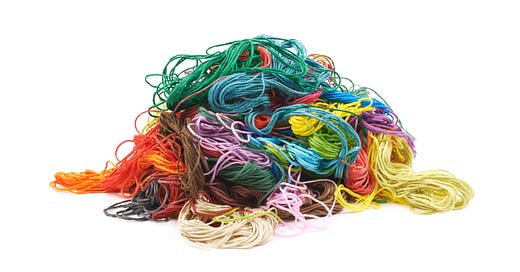Throughout my entire education in English language and literature, the word critical has had a single meaning: engaged in analysis. Literary critics consider what about a work of art is good and what is bad. They ask questions, taking nothing for granted. For the critic approaching a work of literature, nothing is a given. Critical thinking, then, is remaining as objective as possible when presented with an argument or position. It is the most crucial skill for all my professional endeavors, and I have been rigorously trained in it since I was 18.
And I value this skill. Among my highest parenting goals is to raise children who can think critically. I take pictures of bogus advertisements and save staged photographs. Sometimes I ask my children to tell me why they are ridiculous. I ask them to discern what is real.
And I ask my children what lies at the heart of the movies they watch and to consider the hidden messaging. Everywhere you look, I tell them, someone is subtly trying to get you to believe something. You have to ask, Is it true? Or does this messaging want something from me?
The modern world is smack dab in the middle of an epistemological crisis, which is to say we don’t know how to know. We don’t know what information is trustworthy, and we can’t discern truth from a lie. What “news” stories are facts and which are totally made up? What motivations are at play? What is (literally and metaphorically) photoshopped?
As I argue here, this seems to me the inevitable result of an onslaught of information from any-and-every-one (as a result of the internet, where all voices and images are seemingly equally valid) and no time for our brains to catch up to the radical changes in the way information is received and must be processed.
Like Sara Peterson, I am fascinated by momfluencers who use idyllic family and home photographs to convince other women there is a best way to live.

Like this podcast, I am fascinated by Instagram therapists, who operate outside of a one-to-one relationship and with zero professional accountability.
Kids who can think critically can survive the constant onslaught of images and punditry that will certainly be a part of their teenage and adult lives.
Of course, the word critical has another definition. It can mean to disapprove, to judge. It can mean looking (only) for faults. When I edit or proofread, I can turn on this mode, meticulously searching for mistakes.
Sometimes, I go into this mode with relationships. Sometimes, my critical analysis kicks in when it is unwanted or even unwarranted. This kind of criticism is… less good.
Aside from what this knowledge crisis has done to our brains, I’d argue it’s also done something to our hearts. It is fundamentally disorienting not to know who to trust.
And yet, when we think we have all the answers, our brains shut down upon hearing any information that doesn’t align with our codified assumptions. We are unable to approach anything with the intellectual humility true learning requires.
The struggle, as always, is to stay between two things.
Critical, because not every piece of information is good, not every institution or person is trustworthy.
Generous, because some are. Generous, because we must trust some things anyway.
As I’ve mentioned before, in my twenties I started pulling the thread of my own worldview. I pulled and pulled. This was good, meaningful work, and it changed me for the better. I became more empathetic and tolerant and open. But after a while, I saw the whole thing had unraveled. Where a worldview functioning as a cozy blanket used to be, I saw a pile of yarn at my feet, useless.
I thought the pulling was the hard work, and yes, it was painful. But the job wasn’t over; I had to start stitching something back together.
Because danger, I think, lies in both extremes. As Bonnie Kristian says in this podcast:
What happens if you are endlessly critical? What happens if you let it all go? (Despair.)
What happens if you are never critical? What happens if you won’t let anything go? (Pride, apathy.)
Because of personality or disposition or training, most of us probably err on one side or the other. I follow a few people on Instagram who are so distrusting it makes me feel despair by association. (It doesn’t help that cynicism is the easier mode for me.) I also follow people who are so naive they rankle with their own “rightness.”
This between-two-things model is hard work.
Rather than being critical and generous in equal measure, Kristian suggests a seasonal model. We can have seasons of asking questions and seasons of abiding inside the best answers we have. We can have seasons of pulling and seasons of stitching.
I’d say the mark of holding tension is a sacred discomfort. Discomfort is productive. We can entertain thoughts without accepting them (Aristotle). Rather than glib acceptance or ruthless criticism, we can maintain a stance of careful discernment.
And when we’re deciding whom to listen to, whether a person is both critical and generous is a pretty good measure of whether they are doing the hard work of discernment or just reinforcing the worldview of their “in-group.”
To effect positive change, we walk between a trust we choose (that may or may not be warranted) and a longing for improvement. We assume the best of “the other side,” believing most of us want to make things better—for ourselves, for the people we love, for the world. And we ask hard questions of institutions and leaders and culture and, always most importantly, ourselves.








Well Done! It has occurred to me lately that the “critical thinking deficit” has a somewhat different presentation in those--like me!--who are in a more mature age group. For myself, I had an unraveling at twenty-- but then again at 55. When we first met, I too was at the stage of assessing the pile of yarn and in the throes of creating something new. In a far too delayed fashion--I am a very slow pilgrim--I discovered what I had presumed my solid critical thinking skills had atrophied. This was particularly hard to accept. I recently have had occasion to spend time with some very successful men in my “age class” and unlike your children who don’t know what they don’t know, the difficulty in this group has been an incipient move to a binary right/wrong consideration in the name of “critical thinking.” A mode of thinking hard to give up. As you so nicely illustrate, a necessary, but not sufficient way of seeing the world. I would suppose this was why Lewis viewed pride as the worst of sins. A view with which I must reluctantly concur.
So good!!